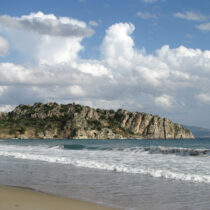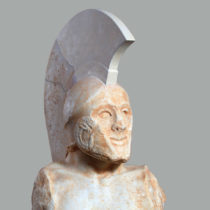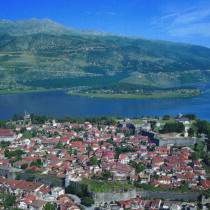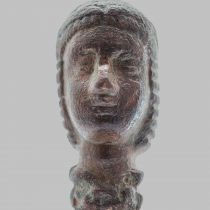Professor discovers new origins for farmed rice
Rice farming is a far older practice than we knew. In fact, the oldest evidence of domesticated rice has just been found in China, and it’s about 9,000 years old.
The call of the sea: Mammalian evolutionary transitions back to the sea
Though mammals adapted on land, a new study has shown that during three major independent evolutionary events, a number of mammals harkened back to the sea.
Devon excavation remaps limits of Roman empire
A team of archaeologists, students and local volunteers have unearthed evidence of a Romano-British settlement in a rural Devon village.
Fossilized root meristems from 300-million-year old soil found
Scientists at Oxford University have discovered the oldest known population of plant root stem cells in a 320 million-year-old fossil.
The base of the Great Pyramid of Giza is not quite square
Scientists have concluded that the base of the Great Pyramid of Giza is lopsided, due to a mistake made by builders during its construction.
Ancient DNA shows perfect storm felled Ice Age giants
Giant Ice Age species that once roamed the windswept plains of Patagonia were finally felled by a perfect storm of a rapidly warming climate and humans, a new study has shown.
How the mouse outlived the giant
Groundbreaking research by Wits scientists sheds light on the ancestry of mammals and the origin of hair.
The world’s oldest farmers
An international team of researchers has discovered the oldest fossil evidence of agriculture, not by humans, but by insects.
Elongated skull from Silla culture unearthed in Korea
The "cone-headed" skull of a woman’s remains found in Korea has puzzled archaeologists.
Iraqi Kurdistan Site Reveals Evolution towards the First Cities of Mesopotamia
A Universitat Autònoma de Barcelona (UAB) campaign at the site of Gird Lashkir, in Iraq, reveals the evolution from the first farming societies to the consolidation of the first cities of Mesopotamia.
Research on massive vertebrae sheds new light on Alamosaurus sanjuanensis
Paleontologists from the Perot Museum have co-authored a paper about nine beautifully articulated vertebrae discovered nearly two decades ago.
Artifacts discovered on return expedition to Antikythera Shipwreck
An international research team has discovered spectacular artifacts during its ongoing excavation of the famous Antikythera Shipwreck (circa 65 BC) this month.
Thravsma. Contextualising the Intentional Destruction of Objects in the Bronze Age Aegean and Cyprus
This volume is an initial step in addressing a gap in the scholarship by aiming to deconstruct and contextualize the practice of intentional fragmentation.
Book chronicles rise of urban planning in ancient Egypt
The pyramids and temples of Egypt were the result of some of the world’s first urban planners—the ruling pharaohs who invested in town planning.
How early mammals evolved night vision to avoid predators
Early mammals evolved in a burst during the Jurassic period, adapting a nocturnal lifestyle when dinosaurs were the dominant daytime predator.
Researchers find Highland East Asian origin for prehistoric Himalayan populations
New study finds that the genetic make-up of high-altitude Himalayan populations has remained remarkably stable despite cultural transitions and exposure to outside populations through trade.
Homo Erectus footprints discovered
A team of Italian archaeologists have discovered fossilized footprints in the desert of south eastern Eritrea, probably of Homo Erectus.
Hundreds of ancient artifacts seized during a raid on a souvenir shop in Jerusalem
Israel Antiquities Authority (IAA) agents confiscated bronze arrowheads, 2,000-year-old coins, perfume vessels, and other ancient artifacts during the raid of a souvenir store in an upscale Jerusalem mall that was lacking a proper license.
“No giant leap for mankind. Why we’ve been looking at human evolution in the wrong way”
In an opinion article originally published on The Conversation Professor of Human Evolution at the University of Cambridge, Robert Foley discusses why we’ve been looking at human evolution in the wrong way.
700-year-old West African soil technique could help mitigate climate change
Ancient farming practice could be the answer to offsetting CO2 emissions and preventing food shortages.
Study hopes to solve mystery of tomb KV55 in Luxor
A study of gold chips from tomb KV55 will be initiated this week aiming to reveal the individual of the sarcophagus, the Ministry of Antiquities announced on Wednesday.
Historic fossils find new life telling the story of ancient proteins
A few snippets of protein extracted from the fossil of an extinct species of giant beaver are opening a new door in paleoproteomics, the study of ancient proteins.
Wine used in ritual ceremonies 5000 years ago in Georgia, the cradle of viticulture
Vine pollen has been found in a zoomorphic vessel used in ritual ceremonies by the Kura-Araxes population.
Egyptian mummified head bears traces of dermatosis linked with skin bleaching cosmetics
Ancient Egyptians regarded the use of cosmetics both for aesthetic purposes as well as magical and religious ones, and the use of such cosmetics was common among members of royal families.




























